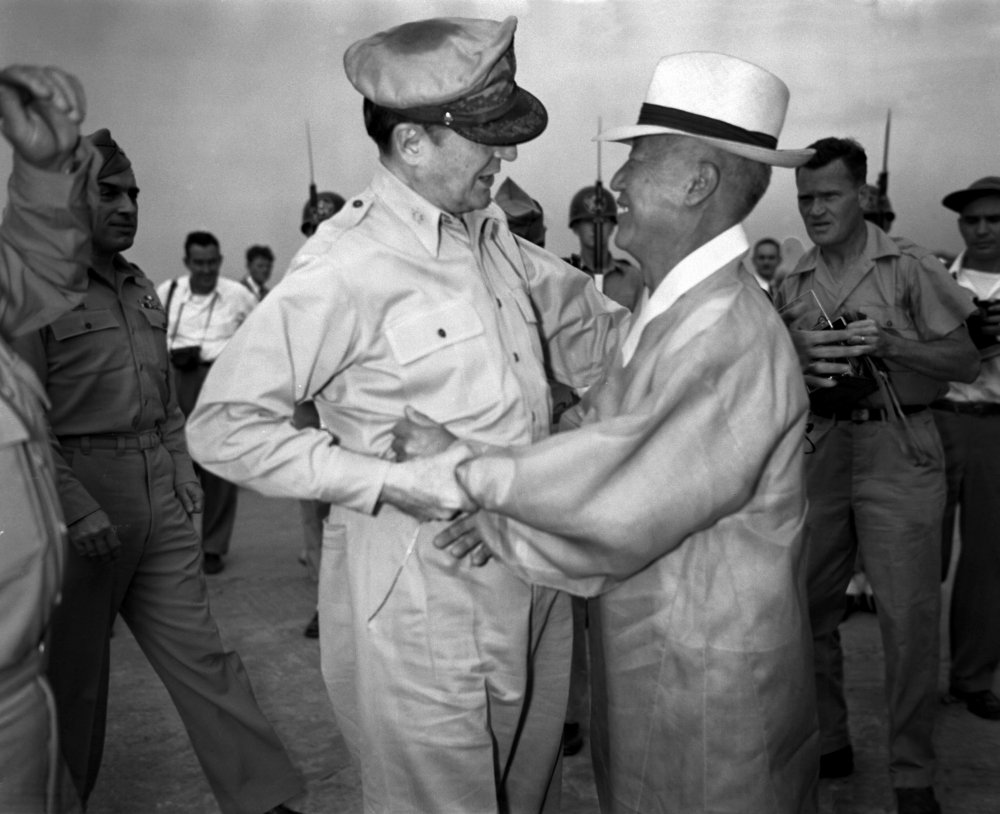
Douglas MacArthur (26 January 1880 – 5 April 1964) was a prominent military leader who served as General of the Army for the United States of America, as well as a field marshal to the Philippine Army. He was Chief of Staff of the United States Army during the 1930s, and he played a prominent role in the Pacific theater during the Second World War. In 1942, MacArthur became supreme commander, Southwest Pacific Area. During the Allied occupation of Japan following the war, MacArthur held the title of Supreme Commander for the Allied Powers (SCAP). He led the United Nations Command in the Korean War, but was contentiously removed from command by President Harry S. Truman on 11 April 1951, due in part to the fact that MacArthur had publicly challenged Truman’s leadership by threatening to attack China directly.[1] He died in Washington, D.C. on 5 April 1964 at the age of 84.
In MacArthur's farewell speech after being removed from command, he referred to the Pacific as a "vast moat to protect us as long as we held it" and characterized the strategic importance to the U.S.'s dominance in the region by saying "it acts as a protective shield for all of the Americas and all free lands of the Pacific Ocean area. We control it to the shores of Asia by a chain of islands extending in an arc from the Aleutians to the Marianas held by us and our free allies. From this island chain we can dominate with sea and air power every Asiatic port from Vladivostok to Singapore -- with sea and air power every port, as I said, from Vladivostok to Singapore -- and prevent any hostile movement into the Pacific." In this speech, he emphasized that if there were holes in this chain of dominance, particularly the loss of Japan or the Philippines, this "might well force our western frontier back to the coast of California, Oregon and Washington."[2]
Korean War
According to historian Bruce Cumings, from November 1950, General Douglas MacArthur ordered that a wasteland be created between the fighting front and the Chinese border, destroying from the air every "installation, factory, city, and village" over thousands of square miles of north Korean territory. On 9 July 1950, two weeks into the war, MacArthur sent a message that prompted the joint chiefs of staff (JCS) "to consider whether or not A-bombs should be made available to MacArthur." One general received from MacArthur a suggestion for the tactical use of atomic weapons, which included occupying the north and handling potential Chinese or Soviet intervention. On 9 December MacArthur said that he wanted commander's discretion to use atomic weapons in the Korean theatre, and later submitted a list of targets for which he required 26 atomic bombs. In an article published by the History News Network, Cumings writes of MacArthur's plans for nuclear weapon use in the war:
In interviews published posthumously, MacArthur said he had a plan that would have won the war in 10 days: "I would have dropped 30 or so atomic bombs . . . strung across the neck of Manchuria." Then he would have introduced half a million Chinese Nationalist troops at the Yalu and then "spread behind us -- from the Sea of Japan to the Yellow Sea -- a belt of radioactive cobalt . . . it has an active life of between 60 and 120 years. For at least 60 years there could have been no land invasion of Korea from the North." He was certain that the Russians would have done nothing about this extreme strategy: "My plan was a cinch."[3]
References
- ↑ "General Douglas MacArthur Delivered His Farewell Address to a Joint Meeting of Congress." US House of Representatives: History, Art & Archives. Archived 2022-11-04.
- ↑ MacArthur, Douglas. “American Rhetoric: General Douglas MacArthur -- Farewell Address to Congress.” Americanrhetoric.com. Archived 2022-11-04.
- ↑ Cumings, Bruce. "Why Did Truman Really Fire MacArthur? ... The Obscure History of Nuclear Weapons and the Korean War Provides the Answer." History News Network. Archived 2022-11-04.